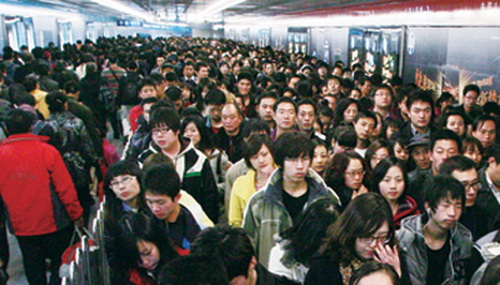Commentary from This Week's Paper

Who's Afraid of Transparency?
By Wei Liming (魏黎明), a senior reporter with the EO's Shenzhen Bureau
Economic Observer Online
Despite the original budget estimate for spending on the Asian Games in Guangzhou being around 2 billion yuan, it appears that almost 200 billion yuan was spent on holding the "thrifty" Asian Games.
The closing ceremony of the sporting spectacle was held months ago, but the official accounts of how much was spent have still not been made public.
Some officials believe that by making more information public, it will create more controversy and interfere with efficiency.
But this kind of efficiency is not what we want, and can result in the huge waste of public finances and serious corruption.
The government should increase its efforts in cooperating with the media to supervise the actions of the government and public spending.
Greater transparency is not the enemy of efficiency, but rather the enemy of corruption and waste.
Original article: [Chinese] 
To Monitor Mobile Phones in the Name of Relieving Traffic Congestion Borders on Illegal
By Zhou Minghua (周明华), an editor from a Chengdu newspaper
Economic Observer Online
The Beijing government recently announced that it hopes to establish an information platform capable of monitoring the location of all of the city's 17 million China Mobile cell phone users. The government department in charge of the initiative says that it's aimed at helping the city government improve the management of population and traffic movements.
It's definitely a shared dream that one day we will live in a city with less severe or perhaps even no traffic jams, however, it's a civil right that our privacy is not infringed.
China's criminal law says, any working unit leaking personal information will be punished. Though there is no law that prevents the government from releasing private information about an individual, there are regulations that say information release should go through a "legal process."
However, we are yet to say any sign that such a process has been considered in the development of this proposed platform.
Original article: [Chinese]
Obstacles to Solving the Child Beggar Problem
By Xue Zhaofeng (薛兆丰), a researcher with the National School of Development and the Chairman of the Institute for Law and Economics both of which are at Peking University
Observer, page 35
Child beggars are attracting a lot of attention. It has been suggested that the Chinese government should prevent children from begging. But, that might not be such a good suggestion.
We all think that when children are abducted, healthy children are sold to families while disabled children are always being forced to beg in the street. But there are other children who may be the children of beggars or other poor families who are urged to beg by their relatives.
The question becomes, when we tackle child trafficking, how do we distinguish between children that have been forced to beg by traffickers from those who beg out of poverty?
Another question is, if child begging is a social problem that requires a change in the social structure, how can we solve the problem through legislation?
Original article: [Chinese]
Government Cracks Down on Child Traffickers, But Not Out of Sympathy
By Yang Tao (杨涛), an EO reporter
Economic Observer Online
Yu Jianrong, a professor with the Chinese Academy of Social Science, has called for Sina microblog users to upload pictures of children begging in the street to their micro blogs. He hopes that the pictures will help relatives to find missing children and report traffickers to the police.
Professor Yu is no doubt a warmhearted man and his suggestion has already helped police rescue six abducted children. Professor Yu and the internet users who have supported his cause appear to be motivated by good intentions to protect the rights of children.
But the government rarely gets involved out of sympathy. The government has become involved because it wants to improve the image of local cities and streets.
But it is because of government neglect that there are so many child beggars in Chinese cities.
Original article: [Chinese]
When Taiwan Returns to a "One China Policy"
Gong Ling (宫铃), senior media worker in Taiwan, independent contributor
Economic Observer Online
The Taiwan president Ma Ying-jeou has required the Island's government agencies to stop referring to mainland China as China and advised them that "the mainland" should be used instead.
The Chinese media has viewed it as a signal that the Taiwan leader "is embracing the 'one China policy,' but in fact, Mr. Ma is only following the Taiwan "constitution" which says both Taiwan and the mainland belong to the Republic of China.
According to the 1992 Consensus (九二共识), both Taiwan and the mainland should abide by the one China policy, but may be permitted to interpret "one China." differently.
Judging from Ma's words, he is trying to integrate the mainland into Taiwan, not bring Taiwan closer to the mainland.
Original article: [Chinese]
How Will China Deal With the Age of "Competition for Labor"
By Ni Bidong (倪璧东), an EO reporter
Economic Observer Online
Chinese enterprises located in the wealthirt eastern provinces of the country may find themselves needing to compete with their central and western counterparts in recruiting migrant workers, an indication that China has shifted from an age of "competition for capital" to a new era based on the "competition for labor."
This sounds like good news for China's migrant workers, who have long endured low pay and poor working conditions. But, we should also pay attention to the following questions: will China's economic growth be able to stand this increase in labor cost? Is such a salary hike reasonable and acceptable?
While salaries of migrant workers have been continuously rising, the income of college graduates have been falling. If things continue like this, less and less Chinese families will be willing to invest in children's education. This is definitely troubling for a modernizing country.
Original article: [Chinese]
The views posted here belong to the commentor, and are not representative of the Economic Observer |
Related Stories
Popular

- BOOK REVIEW
- February 2011 Issue of EO's Book Review
- Interviews with historian Gao Hua (高华), academic Du Junfei (杜骏飞) and well-known author Yue...
Interactive
Multimedia

- EEO.COM.CN The Economic Observer Online
- Bldg 7A, Xinghua Dongli, Dongcheng District
- Beijing 100013
- Phone: +86 (10) 6420 9024
- Copyright The Economic Observer Online 2001-2011
















